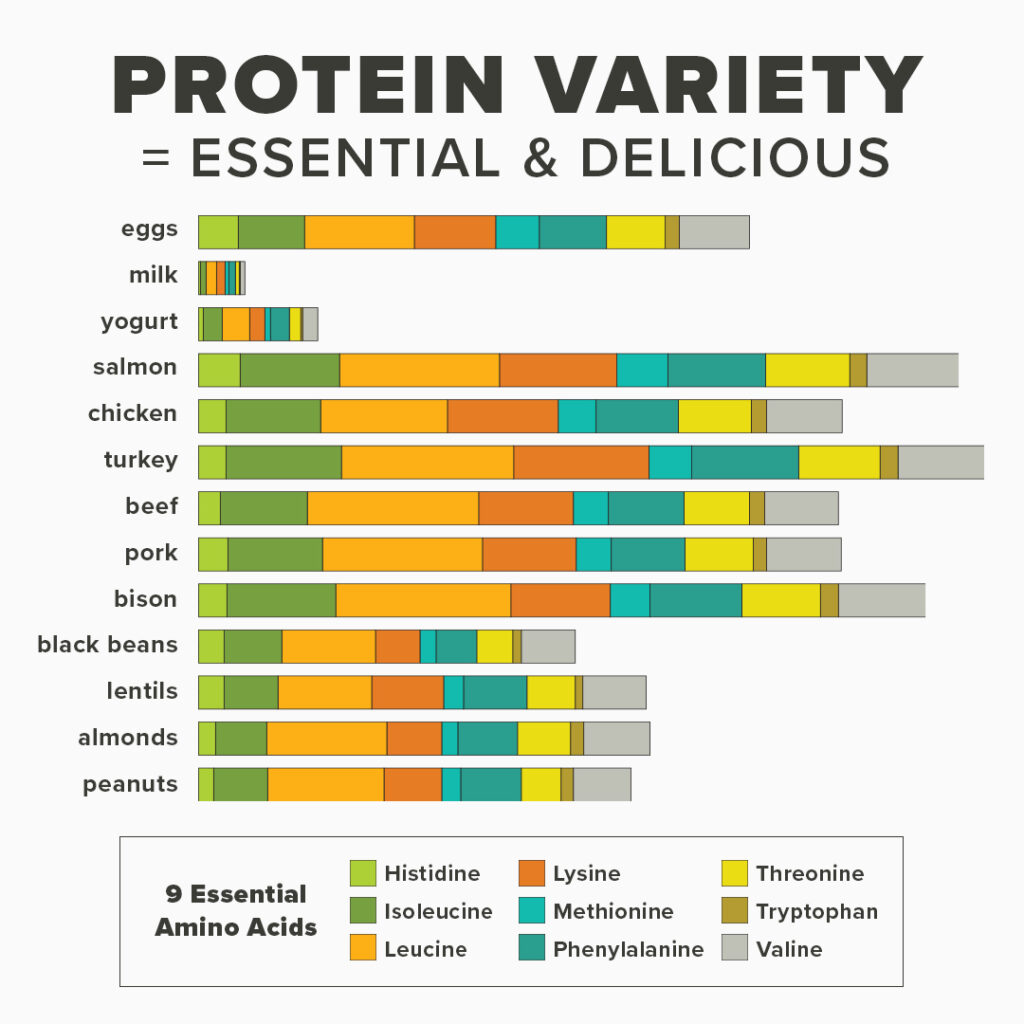While the United States may not be at the top of the list for nutrient deficiencies, that doesn’t mean we are “healthy” by any stretch of the imagination. In fact, a lack of food variety in our diet has caused American adults to find themselves lacking many vital micronutrients that can not only improve and preserve health but also help improve our mental and physical performance.
Research has shown that the US population suffers from many common nutrient deficiencies. For instance, researchers have found that Americans are:
• 45% low in vitamin A
• 46% low in vitamin C
• 95% low in vitamin D
• 84% low in vitamin E
• Honorable mentions: Magnesium, Zinc and B12
The startling piece from the data above is that those are only a few of the many vitamins and minerals we are deficient in. What can we do to solve this issue? It starts with food variety and limiting the consumption of ultra-processed foods.
Let’s dive into things a little deeper to help you better understand the importance of food variety.
Disclaimer: This article is for informational purposes only and is not meant to treat or diagnose any condition. It is recommended that you speak with your doctor before making any changes to your diet.

Lack of Food Variety Can Lead to Deficiencies
Many of us are creatures of habit and find ourselves consuming the same foods weekly or even daily. While consuming the same healthy foods daily may sound like something we should all strive for, we can’t neglect food variety in our diets.
When you fail to focus on food variety, it makes taking in your recommended daily intake of vitamins and minerals impossible. Every food you consume will have a different nutritional value, which makes food variety extra important to ensure you are getting a full spectrum of micronutrients in each meal.

The Benefits of Food Rotation Utilizing Whole Food Sources
Food rotation in the sense of swapping out protein, carbohydrate, and fat sources is key to preventing nutrient deficiencies and adding some excitement to your nutrition plan.
Below are some benefits of food rotation:
1. Swapping out foods can prevent food sensitivities.
2. Changing whole food sources helps prevent nutrient deficiencies.
3. Food variety can keep boredom at bay and make mealtime more enjoyable.

The Comfort in Convenience Leads to Excess Processed Foods
It should go without saying that you should limit your consumption of processed foods. Truth be told, there’s really no benefit to having them in your diet.
A sad reality is the fact that around 74% of American adults are overweight. Unfortunately, that number seems to continue increasing with each passing year. What could be a major contributor to these high numbers? Ultra-processed foods.
Data indicates that around 73% of the US food supply is ultra-processed. What makes ultra-processed foods so appealing? It’s typically due to a nearly 52% price reduction compared to healthier alternatives and the fact that they tend to be easier to prepare. They’re also just easier to eat! Ultra-processed foods are highly palatable, meaning they’re very easy to overeat and lead to a calorie surplus.
In many cases, ultra-processed foods lack crucial nutrients, leading to potential nutrient deficiencies. Not only that, but the lack of quality macronutrients on top of minimal micronutrient profiles can lead to excess weight gain.
If you want to enjoy the body you live in and keep it running optimally, you need healthier food choices and better food variety.

5 Ways to Improve Weekly Food Variety
Increasing food variety in your diet can be both enjoyable and beneficial for your overall health, as it can ensure you get a wide variety of micronutrients.
Here are some ways to increase food variety:
1. Include a Rainbow of Colors – Aim to include a variety of colorful fruits and vegetables in your diet. Different colors often indicate different nutrients.
2. Seasonal Eating – Embrace seasonal produce, as it not only adds variety to your diet but also ensures that you consume fresh, locally available foods.
3. Include Different Protein Sources – Vary your protein intake by including sources such as grass-fed beef, bison, wild game, turkey, chicken, fish, eggs and even collagen.
4. Diversify Your Breakfasts – Rotate through various breakfast options such as oatmeal with turkey sausage, yogurt with fruits and nuts, and different types of eggs and veggies.
5. Mix-Up Cooking Methods – Roast, steam, air fry, grill, sauté, and boil your food. Different cooking methods can bring out different flavors and textures in ingredients.

Convenient Meals with Impressive Food Variety
If you want to simplify the whole process, utilize our delicious meals as part of your nutrition plan. Our mouth-watering menu provides you with the ultimate in food variety. Everything you can think of is at your fingertips and can be delivered to your doorstep.
With a rotation of four different weekly menus, you have enough food variety that you won’t eat the same meal twice in a month. If you want to simplify your nutrition and meal planning, Metabolic Meals is here to help!
Find the nutrition you need on this week’s menu.
SHOP NOW >






